Ear Ache After Wisdom Tooth Extraction: Causes and Relief
Content
Many patients experience an earache after wisdom tooth extraction. This discomfort is often a normal part of the recovery process. You should understand its causes and when to seek medical help for a swift healing journey.
This guide will explore why ear ache after wisdom tooth extraction happen. And provide practical advice for relieving discomfort.
Is It Normal To Have Ear Pain After Wisdom Teeth Extraction?
Experiencing discomfort or pain after wisdom teeth removal is common. Ear pain is a common symptom.
Some people will experience minimal discomfort. While others could face a range of symptoms, like swelling, slight bleeding, and ear pain. This pain is a result of the inflammation and the healing process in the jaw. It can affect surrounding areas and the ears.
Can Wisdom Teeth Removal Cause Earache?
Yes, wisdom teeth removal can cause an earache. This is due to the complex network of nerves in the jaw and face. It can send pain signals to other parts of the head, including the ears.
Ear Pain 10 Days After Wisdom Teeth Removal
It is normal to experience ear pain ten days after wisdom teeth removal. But, most symptoms should lessen by this point. If the pain continues, it signals that your body is still healing or that there may be a complication. It could be an infection or dry socket, you might need an evaluation by your dentist or oral surgeon.
Throbbing Ear Pain After Wisdom Tooth Extraction
Throbbing ear pain after wisdom tooth extraction can be particularly distressing. This type of pain often indicates the body’s inflammatory response to the surgery. Over-the-counter pain relief can help manage symptoms and persistent throbbing pain.
Jaw and Ear Pain 3 Weeks After Wisdom Tooth Extraction
If you experience jaw pain three weeks after the procedure, consult your dentist. While some discomfort can be normal, ongoing pain might suggest infection.
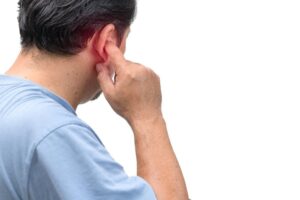
Recovery from Wisdom Tooth Removal
The initial days following the extraction are crucial for a smooth recovery. As the body heals, it’s common to experience discomfort. Follow your oral surgeon’s care instructions, it can aid in your recovery.
How to Treat Ear Ache After Wisdom Tooth Extraction: Tips for Relief
Ear pain following wisdom teeth removal can be uncomfortable. Due to the shared nerve pathways in the face and jaw. Here are several tips on how to relieve ear pain from wisdom teeth removal:
- Cold Compresses: Applying cold compresses to the cheek can help reduce inflammation. Apply the compress in 15-minute intervals.
- Elevation: Keep your head elevated while sleeping, to help reduce swelling and discomfort.
- Warm Salt Water Rinses: Rinsing your mouth with warm salt water a few times a day can reduce the risk of infection. Also, it can ease the ear pain.
- Pain Management: Your dentist may recommend over-the-counter pain relievers to manage the pain.
- Stay Hydrated: Drinking plenty of water can aid in the healing process and keep the mouth clean.
- Soft Foods: Eat soft foods to reduce discomfort. Avoid dislodging any blood clot at the extraction site, which is crucial for healing.
- Avoid Smoking: Smoking can delay healing and increase the risk of complications. Also, avoid using straws it can dislodge the blood clot from the socket.
- Follow-up: Keep scheduled follow-up appointments with your dentist.
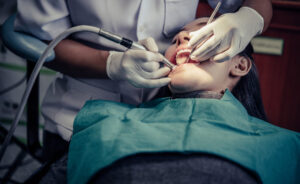
Why Does My Neck and Ear Hurt After Tooth Extraction?
Experiencing neck and ear pain after a tooth extraction is common. Understanding these reasons can provide reassurance during recovery:
- Nerve Involvement: The nerves in the jaw are linked to those in the ear and neck. During the procedure these nerves can be affected, leading to referred pain in the ear and neck area.
- Inflammation: The removal of a tooth leads to an inflammatory response. The inflammation can extend to surrounding areas. It can affect the muscles and tissues around the neck and ear, causing discomfort and pain.
- Muscle Strain: Keeping your mouth open for an extended period during the extraction can strain your jaw muscles. This strain can result in pain that affects the neck and ear.
- Infection: Although rare, if an infection develops it can cause a swelling that reach the neck and ear. Monitoring for signs of infection is crucial for timely intervention.
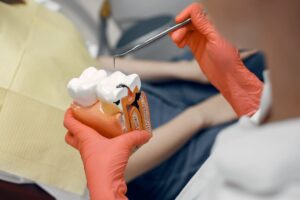
How Long After Wisdom Tooth Extraction Should My Jaw and Ear Hurt?
The duration varies among individuals. Depending on factors like the complexity of the extraction, pain tolerance, and adherence to care instructions.
- First Few Days: It’s normal to experience discomfort and pain within the first 72 hours.
- First Week: By the end of the first week, you should notice a significant decrease in pain and swelling. But, some residual pain, including in the jaw and ear, can persist as the healing continues.
- Beyond One Week: Most symptoms will fade within the first week. Expect mild discomfort in the second week, especially if the extraction is complicated.
Should My Jaw Still Hurt 5 Days After Wisdom Teeth Removal?
It’s common to experience discomfort or pain in the jaw five days after wisdom teeth removal. The degree of discomfort can vary depending on several factors.
If the pain in your jaw does not decrease or worsens this could be a sign of an infection or a dry socket. In such cases, consult your dentist for a follow-up examination.
What Are the Signs of Infection After Tooth Extraction?
Infection following a tooth extraction, while not common, can occur. Recognizing the signs of infection can prevent further complications. Here are some indicators that might suggest an infection:
- Increased Pain: If the pain becomes more intense without signs of diminishing.
- Swelling: If it doesn’t decrease after the first few days or worsens, it may be a sign of infection.
- Redness and Warmth: If the area around the extraction site becomes red it can mean an infection.
- Unpleasant Taste or Smell: An unpleasant taste or odor from the extraction site can be a symptom of infection.
- Pus: The presence of pus or a white or yellow discharge around the extraction site is a clear sign of infection.
- Fever: Developing a fever can signify that your body is fighting an infection.
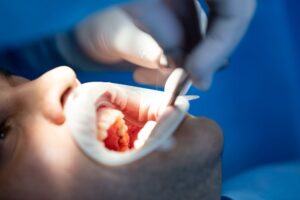
What to Eat After Wisdom Teeth Removal?
After wisdom teeth removal, the goal is to cut irritation at the extraction site. Here are some recommendations for foods to eat following your procedure:
- Soft Fruits: Bananas and other soft fruits are excellent. Because they need minimal chewing and have vitamins.
- Soups and Broths: Warm (not hot) soups and broths can be soothing and provide hydration.
- Yogurt: Its creamy texture makes yogurt an ideal post-extraction food. It’s also rich in protein and probiotics, aiding recovery.
- Mashed Potatoes: This comforting food is easy to consume and a good energy source.
- Scrambled Eggs: Eggs are soft and protein-rich a great option for post-surgery nourishment.
- Smoothies: Smoothies are an excellent way to consume fruits and vegetables without chewing. Avoid using straws, as the suction can disrupt the healing process.
- Oatmeal: Soft and warm oatmeal can be comforting, but it should be cool and cooked until very soft.
Foods to Avoid
- Crunchy and Hard Foods: Nuts, chips, and popcorn can aggravate the extraction site.
- Sticky Foods: Sticky candies can pull on the extraction site, leading to discomfort.
- Spicy and Acidic Foods: These can irritate the extraction site and should.
- Very Hot Foods and Beverages: Extreme temperatures can cause discomfort and disrupt healing.
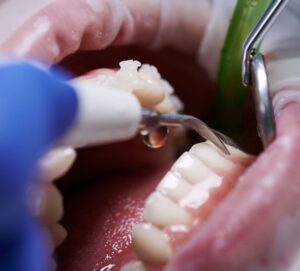
When to Seek Professional Guidance
While it’s normal to experience some discomfort and swelling after wisdom teeth removal. Certain signs warrant professional guidance. Here’s when you should reach out to your dentist or oral surgeon:
- Persistent or Increasing Pain: If pain persists beyond a few days and doesn’t improve with prescribed medication.
- Signs of Infection: Symptoms such as fever, pus, or foul discharge from the extraction site.
- Bleeding That Doesn’t Subside: Some bleeding is normal within the first 24 hours. But if it continues or is heavy, seek professional help.
- Difficulty Opening Your Jaw: Some stiffness and discomfort are normal. But if you find it extremely difficult to open your mouth or if the condition persists.
- Nausea or Vomiting: While not common, if you experience persistent nausea or vomiting after your extraction, it could be related to medication or the procedure itself.
Be mindful of the signs that need professional guidance. Always follow the specific post-operative care instructions.
Dealing with an earache after a wisdom tooth extraction can be uncomfortable. But it’s manageable with the right knowledge and care.
If you’re experiencing persistent or severe symptoms, consult your dentist. Visit our website for more insights into managing dental health. Explore a wide range of dental treatments. Discover the best practices for a healthy, pain-free recovery.

